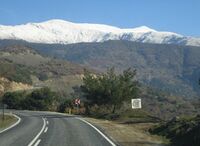Religion:Tmolus

Tmolus /ˈmoʊləs/ (Ancient Greek:, Tmōlos) was a King of Lydia and husband to Omphale. In Greek mythology he figures as a mountain god, a son of Ares and Theogone and he judged the musical contest between Pan and Apollo. When Tmolus was gored to death by a bull on the mountain that bears his name, his widow, Omphale, became Queen-regnant of Lydia. Through her, Lydian reign passed into the hands of the Tylonid (Heraclid) dynasty. He is perhaps the Tmolus who, according to a scholion to Euripides Orestes 5, was the father of Tantalus by Plouto.[1]
Mount Tmolus (modern Bozdağ), named after Tmolus, King of Lydia, is in "a mountain range on the south of Sardes, forming the watershed between the basins of the Hermus in the north and the Cayster in the south, and being connected in the east with Mount Messogis."[2] It lies in Lydia with the Lydian capital Sardis at its foot and Hypaepa on its southern slope. The mountain was "celebrated for its excellent wine growing slopes. It was equally rich in metals; and the river Pactolus, which had its source in Mount Tmolus, at one time carried from its interior a rich supply of gold."[2] The geography of Tmolus and the contest between Pan and Apollo are mentioned in Ovid's Metamorphoses, XI.168.
Notes
References
- Catholic Encyclopaedia (passim)
- Gantz, Timothy, Early Greek Myth: A Guide to Literary and Artistic Sources, Johns Hopkins University Press, 1996, Two volumes: ISBN 978-0-8018-5360-9 (Vol. 1), ISBN 978-0-8018-5362-3 (Vol. 2).
- Ovid's Metamorphoses, Book 11, tr. Arthur Golding. http://www.elizabethanauthors.com/ovid11.htm
- Smith, William; Dictionary of Greek and Roman Biography and Mythology, London (1873). "Tmolus 1."
